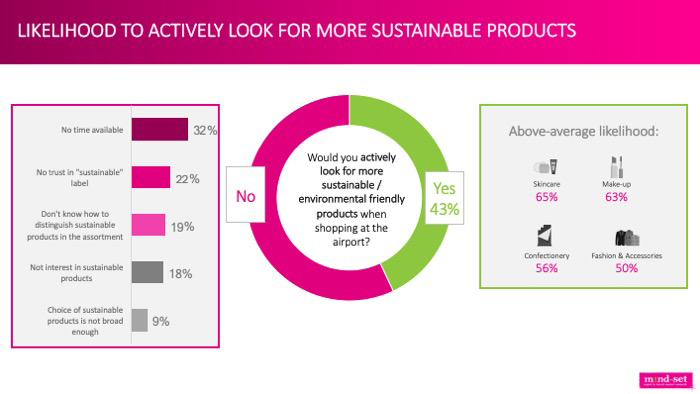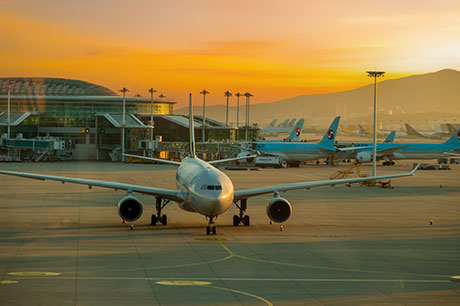Latest report from M1nd-set identifies potential for ‘purpose-driven’ brands
By Charlotte Turner |
 Millennials are leading the ‘purpose-driven’ purchasing drive – or demand for more sustainable products and brands – in travel retail according to the latest consumer insights report from Swiss research agency m1nd-set.
Millennials are leading the ‘purpose-driven’ purchasing drive – or demand for more sustainable products and brands – in travel retail according to the latest consumer insights report from Swiss research agency m1nd-set.
TRBusiness was granted exclusive access to more detailed analysis from m1nd-set in the following article.
The report, which addresses shopper behaviour in travel retail as well as in downtown locations, studies customer groups most likely to purchase from sustainable brands; the price elasticity of sustainable products; the power of social media and peer-influencers on sustainable consumption and the key categories concerned by purpose-driven purchases.
The report also looks at the risks/dangers for those companies not seen to be respecting sustainable business practices.
According to the report, 84% of shoppers interviewed from across all regions of the world, think greater focus on sustainability by manufacturers has a positive impact on their perception of a brand.
Unsurprisingly millennials were among those customer groups scoring higher, with 91% of shoppers from this age group expressing this opinion.
FEMALE TRAVELLERS MORE LIKELY TO SEEK SUSTAINABLE CREDENTIALS
Female travellers and shoppers from Europe and North America also stand out with above-average percentages on the perception of a brand’s sustainability in the channel.
On average, 72% of all shoppers in travel retail said they would be more inclined to purchase from a brand which placed greater focus on its sustainability. This is particularly the case for millennials and female travellers – 78% in each segment agree – while among nationalities, Europeans are the most likely to shop with a brand because of its sustainable qualities (77% in agreement).
The report reveals that 43% of shoppers in travel retail would actively look for more sustainable and environmental friendly products when shopping at the airport.
However, this percentage is significantly higher among millennials (55%) and female travellers, who are proactive in their quest for greener purchases when shopping at airports.
When analysing shopping preferences by region, the report shows that 52% of both European and North American travellers are also above-average ‘green-seekers’.
PRICE ELASTICITY IN SUSTAINABLE GOODS
The categories where more sustainable choices are more likely to be sought are in skincare (65%), make-up (63%), confectionery (56%) and fashion & accessories (50%). Among those who do not seek out sustainable products at airport shops, lack of time is the main reason, followed by a lack of trust in the sustainable certification; confusion about what is and is not sustainable; lack of interest and finally, insufficient selection.
M1nd-set’s sustainability report also shows that on average, 64% of global shoppers said they would be willing to pay more for a sustainable product in duty free and travel retail.
Again women score higher with 70% willing to pay more; 69% for Europeans and 68% for North Americans. Among all shoppers, 40% say they would be willing to pay up to 20% more for a sustainable product and 33% would pay up to 30% more. The report picks up on data reported by the TRBusiness-led industry sustainability initiative, the Travel Retail Sustainability Forum (TRSF), which estimates that the global travel retail industry is responsible for more than 10 billion plastic shopping bags being distributed annually.
The m1nd-set report shows there is also a clear willingness among shoppers in travel retail to opt for more sustainable solutions for the shopping bag. Eighty-six percent of all shoppers say they are willing to pay for a shopping bag, as long as it is reusable and not ‘virgin plastic’. Only 26% say they would rather not pay for their shopping bags; 19% are willing to pay for a reusable plastic shopping bag and 16% say they would rather bring their own reusable shopping bag.
RETHINKING ON REFILL
With water being one of the other key contributors to single-use plastic pollution in duty free and travel retail – an estimated 3bn plastic water bottles are sold at travel retail outlets globally – m1nd-set was keen to find out how consumers felt about their sale in travel retail.
M1nd-set says there is a clear demand from consumers to see single-use plastics for water consumption eliminated, with 71% of shoppers saying they would prefer to refill their reusable water bottles for free from a water fountain.
Seventy-six percent of millennials expressed this preference, however 68% said they would be willing to pay for mineral or filtered mineralised water from a dispenser using their refillable bottles. Only 7% say they would prefer to purchase water in a single-use plastic bottle.
M1nd-set owner and CEO Peter Mohn commented: “We see from the research that sustainability is more than a buzz word or hot topic. It has become a fundamental part the consumer experience for a broad section of shoppers today, in travel retail specifically as well as retail in general.
“Purpose-driven brands and companies have the power to unite consumers, develop and increase loyalty. Consumers are increasingly conscious of the need to be more responsible socially and environmentally, when shopping, travelling or dining out. It’s also important to note that sustainable brands are more resistant to price hikes as consumers clearly express they are willing to pay more for purpose-driven products and services.”
As Mohn goes on to explain, it is essential for companies to increase their communication around their sustainable approaches: “It’s clear from our research that the majority – in most cases, a large majority – of consumers would switch to a purpose-driven brand, i.e. a brand with clear socially responsible or environmentally friendly attributes.
“However, it’s also important to note that around two thirds of shoppers will take action if a company fails to meet consumer expectations on social and environmental responsibility. This does not just refer to how products are sourced or manufactured but also how they are packaged.”
The report also focuses on consumer attitudes to packaging. More than 7 out of 10 of shoppers believe that brands and retailers are currently not doing enough to provide more environmentally-friendly packaging.
A FAIRER FUTURE
Consumers are increasingly influenced by social media’s extensive exposure and coverage of plastic pollution and the dangers to the environment as a direct result of packaging waste and it’s estimated that between 60% and 70% of shoppers, depending on the market, will change their purchasing behaviour because of their concerns about packaging. Only 25% of consumers however say it’s important for packaging to have a luxury aspect, according to the report.
The report concludes with a look at the future development of sustainable brands. Analysing sales growth across all product categories over recent years, m1nd-set reports that sales growth is driven predominantly by sustainably marketed goods such as those with Fair Trade or other sustainable certification, despite representing less than a fifth of all goods sold currently.
This shift in priorities has been particularly significant over the past five years, according to m1nd-set, with sales of sustainable goods growing six times faster than other products. The Swiss research agency predicts this growth will be stronger still in the coming years as purpose-driven companies produce more effective environmentally friendly products, supported by growing consumer demand for such goods.
“While consumers are leading the demand for more purpose-driven products, industry leaders are also calling for a shift towards more responsible production and consumption, even a more responsible, purpose-driven economic system as opposed to profit-driven” Mohn concludes.
“Structural change is necessary in order to address climate change according to several leading CEOs, who are expressing their disdain in increasing numbers with climate change, ocean pollution, deforestation, social inequalities and human rights abuses.
With change driven from both top-down and bottom-up, we believe we’re going to see a paradigm shift in the way companies source, produce, package and sell. This is a global shift, driven by multinationals across all sectors, from consumer goods to technology and even financial institutes. It’s no longer a question of if or when, but how many, how soon and whether your company will be leading or lagging.”
Alcohol insights: Conversion up, spend down in Q4
Conversion of visitors in the alcohol category in duty free has risen to 54% in Q4 2023,...
Men buy and spend more in travel retail says new research by m1nd-set
Men have a higher conversion rate and spend more when shopping in travel retail, says new...
Saudia Arabia's KKIA unfurls T3 duty free expansion
King Khalid International Airport (KKIA) has unveiled the first stage of its much-vaunted duty...
-
 International,
International,Alcohol insights: Conversion up, spend down in Q4
-

-
 International,
International,Saudia Arabia's KKIA unfurls T3 duty free expansion

In the Magazine
TRBusiness Magazine is free to access. Read the latest issue now.

 Trbusiness. The travel retail Trbusiness. The magazine for global retail and duty free professionals.
Trbusiness. The travel retail Trbusiness. The magazine for global retail and duty free professionals.

























